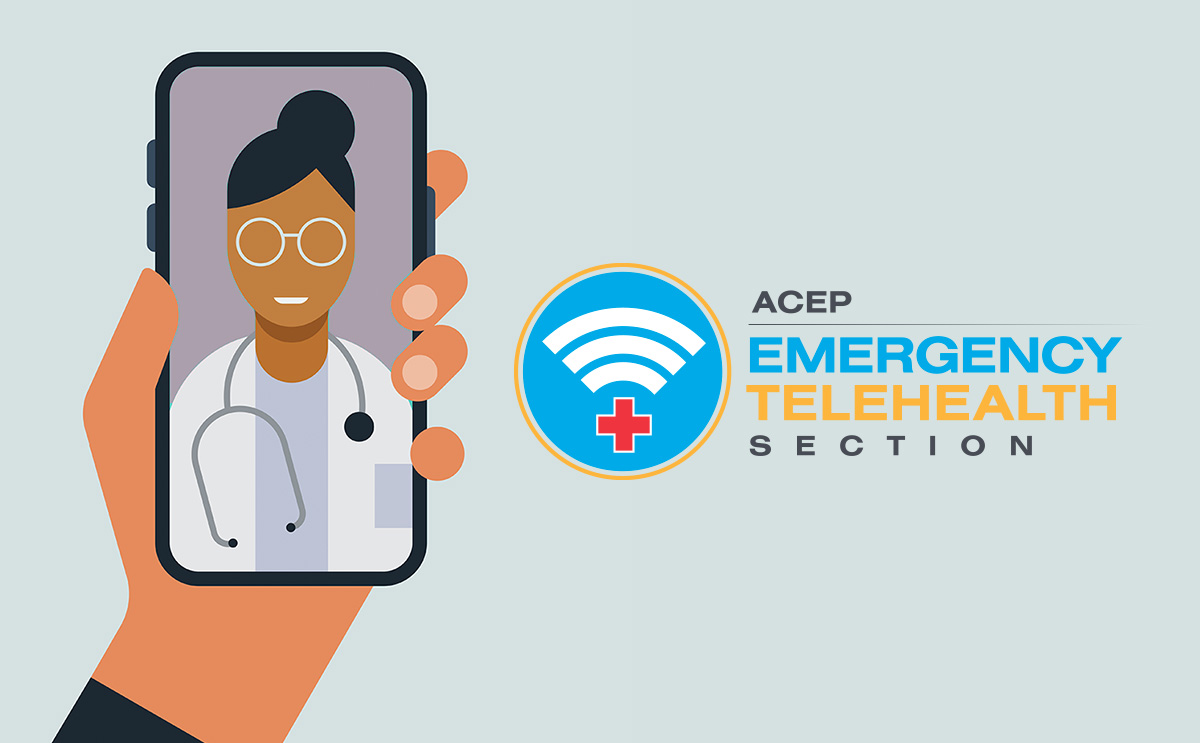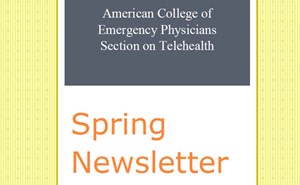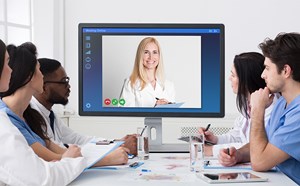
ACEP Emergency Telehealth Section – Summer Newsletter 2025
ACEP Emergency Telehealth Section Leadership Team
Chair: Michael Baker, MD, FACEP
I’ve been a clinical faculty member with the Joseph Mercy Hospital Emergency Medicine Residency Program since 1996, the same program where I received my training. From the beginning of my career, I’ve been drawn to innovation. As a resident, I helped implement the country’s first large-scale physician computerized order entry system and honed early ultrasound skills. That spirit of curiosity has guided me for the past decade in my current role as telehealth director.
I view telehealth as a tool to liberate emergency physicians from the physical constraints of the emergency department. It’s a way to extend our reach, improve access, and reimagine how and where we deliver care. Over the years, I’ve been fortunate to help develop and implement a range of emergency telehealth workflows, including Electronic Personal Protective Equipment (ePPE), Emergency Triage, Treat, and Transfer (ET3), Virtual Provider in Triage (vPIT), and post-discharge telehealth programs. These efforts span the full continuum of acute unscheduled care (pre-hospital, in-hospital, and post-hospital) and reflect my belief that innovation should serve both patients and physicians.
As current Chair of the ACEP Emergency Telehealth Section, I’m energized by the creativity and commitment of our members, and I want to build on the past accomplishments of our section. I love learning about the various ways emergency physicians are utilizing telehealth to address real-world problems and enhance care.
I look forward to seeing everyone at ACEP 2025 and hearing how you’re using telehealth to push boundaries, enhance patient care, and bring new energy to our specialty.
Chair Elect: Marc Bartman, MD
My name is Marc Bartman. I’m an Associate Professor of Emergency Medicine at the Medical University of South Carolina, where I serve as the Director and Co-Founder of the Division of EM Telehealth, as well as the Medical Director for MUSC’s Virtual Urgent Care.
I want to begin by thanking this group for its instrumental role in helping our division navigate the legal and compliance challenges involved in launching our first clinical service. The resources, expertise, and support provided by this section have been invaluable. This section is composed of visionary minds, leaders, and pioneers in telehealth. Like all of you, I am profoundly passionate about this field and firmly believe that integrating telehealth into traditional workflows is essential for the advancement of emergency medicine.
We must continue to champion acceptance and adoption among our colleagues and institutional leaders, encouraging them to embrace the future of emergency medicine. Our collective work is vital to achieving this transformative shift. Furthermore, we share a responsibility to educate and inspire the next generation of innovators. By fostering the development and accelerating the implementation of high-quality telehealth services, we can ensure that emergency medicine continues to evolve to meet the needs of the patients and communities we are privileged to serve.
I look forward to serving as your Chair-Elect.
Secretary: Tran Alexander, MD
Hello ACEP! My name is Alex Tran, and I am proud to serve as the secretary of the ACEP Telehealth Section. As the son of two Vietnamese immigrants, I entered emergency medicine with a commitment to providing comprehensive patient care to people from all walks of life. I completed both my undergraduate and medical education at Brown University, where I studied health systems, structure, and policy, which fostered my interest in how thoughtful design and strategic innovation can address complex healthcare challenges.
In my role as Associate Service Chief for NYU Virtual Urgent Care, I lead a team dedicated to expanding and refining telemedicine services to improve access, efficiency, and quality of care by leveraging virtual care solutions that meet the evolving needs of our healthcare system. My vision for a future in which cutting-edge technologies drive more equitable, user-friendly, and patient-centered care across communities has laid the foundation for projects such as virtual provider in triage, virtual urgent care, tele-observation, and virtual follow-up clinics. I believe telemedicine has the potential to revolutionize emergency care by making it more accessible and efficient, especially for patients who face barriers to traditional in-person visits, such as geographic, financial, or logistical.
Councilor: Iyesatta Massaquoi Emeli, MD, MPH, FACEP
My name is Iyesatta (Satta) Massaquoi Emeli. I currently serve as a Distinguished Physician and Assistant Professor at Emory University. I bring over two decades of clinical experience as an emergency physician, along with a deep interest in the intersection of medicine, technology, and access to care.
Within the ACEP Telehealth Section, I served as newsletter editor for two years and currently represent the section as Councilor. I’ve worked on projects aimed at integrating telehealth into observation medicine workflows and developing sustainable virtual care models adaptable to low-resource environments.
I’m also a storyteller at heart. I write essays and short stories that blend medicine, technology, and the human experience—often drawing inspiration from the ER. You can read more of my work at www.iyesattaMD.com. Additionally, I serve on the executive committee of the ACEP Medical Humanities section. I look forward to connecting with others in our section who are passionate about pushing the boundaries of care through innovation and collaboration.
Alternate Councilor: Kathy Li, MD, MS
Hello! I am honored to serve as the Alternate Councilor for the Telehealth Section this year. I am an Acting Assistant Professor in the Department of Emergency Medicine at the University of Washington and a health services researcher whose interests are shaped by experiences with ED crowding, quality improvement, and patient safety. My research focuses on how telehealth and other care delivery modalities can be leveraged to build more accessible, affordable, and equitable acute care systems. For example, I've studied the role of telehealth in streamlining interfacility transfers to enhance care coordination. I am also interested in shaping policy and regulatory changes related to telehealth to support optimal emergency care delivery.
On the clinical side, I have firsthand experience providing telehealth visits to Veterans calling the nurse advice line for acute concerns, as well as supporting low-barrier access to treatment for opioid use disorder through the UW Telebuprenorphine Hotline. I'm excited to bring this blend of research and clinical experience to the Telehealth Section and look forward to learning from and collaborating with all of you to shape the future of telehealth in emergency medicine.
ACEP Staff Liaison: Ryan McBride, MPP
Hi all, I’m Ryan McBride, ACEP’s Congressional Affairs Director in the Advocacy & Practice Affairs department and I serve as the Section’s staff liaison. I’m based in ACEP’s Washington, D.C. office, heading up our federal legislative priorities in EM, including efforts to extend telemedicine flexibilities and help highlight EM’s role in this area. I’ve been with the College for 8 years, having previously worked for the American Osteopathic Association (AOA), and serving for several Members of Congress on Capitol Hill prior to that.
|
Save the Date! ACEP25 Section Crawl ACEP Emergency Telehealth Section Meeting Lecture: “The Healthcare Workplace: Should You Stay, or Should You Go?” Speaker: Harry Severance, MD, FACEP This lecture will note the Emergency Telehealth Section and options for emergency physicians. |



